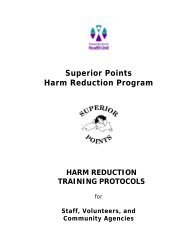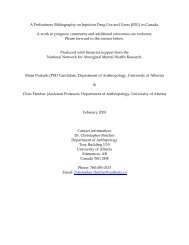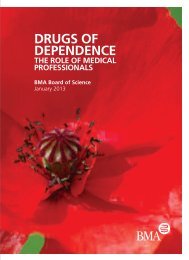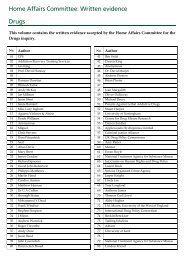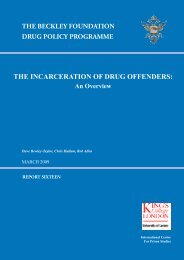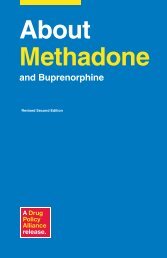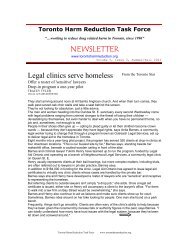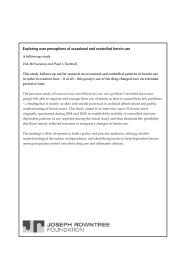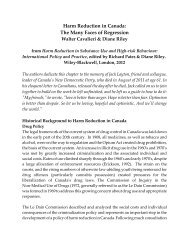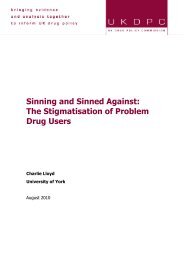Canadian Journal Addiction Medicine - Canadian Harm Reduction ...
Canadian Journal Addiction Medicine - Canadian Harm Reduction ...
Canadian Journal Addiction Medicine - Canadian Harm Reduction ...
Create successful ePaper yourself
Turn your PDF publications into a flip-book with our unique Google optimized e-Paper software.
the<br />
<strong>Canadian</strong> <strong>Journal</strong> of<br />
<strong>Addiction</strong> <strong>Medicine</strong><br />
an official publication of the <strong>Canadian</strong> Society of <strong>Addiction</strong> <strong>Medicine</strong><br />
Treatment Alternatives for<br />
Perinatal Opioid Dependence<br />
Alice Ordean MD, CCFP, MHSc<br />
Toronto Centre for Substance Use in Pregnancy,<br />
St. Joseph’s Health Centre<br />
Perinatal opioid addiction is becoming more prevalent<br />
over the past decade. Consequences of opioid dependence<br />
during pregnancy are related to the repeated cycles of opioid<br />
intoxication and withdrawal leading to increased risk of<br />
miscarriage, premature labour, fetal distress and fetal demise.<br />
Opioid agonist treatment has numerous benefits including<br />
improved prenatal care and reduced obstetrical and<br />
neonatal complications. Methadone maintenance treatment<br />
remains the standard of care; however, alternatives include<br />
buprenorphine and slow-release morphine. Management<br />
from preconception to postpartum will be reviewed.<br />
Challenges in Managing<br />
Benzodiazepine (BZ)<br />
Dependence<br />
Nady el-Guebaly MD, Ronald Lim MD,<br />
Kasia Galperyn PhD<br />
<strong>Addiction</strong> Centre, Alberta Health Services<br />
The presentations will highlight challenges in the prevention<br />
and options for the management of BZs dependence<br />
Why do BZs remain popular? BZs remain the most<br />
prescribed anxyolitic medication. Surveys elicit prevailing<br />
problematic longer term prescriptions. Reasons for BZ popularity<br />
and alternate pharmacotherapies in Anxiety Disorders,<br />
Insomnia and Post Traumatic Stress Disorders will be reviewed.<br />
What are the options in withdrawal regimen<br />
Benzodiazepines as a class of drugs are often difficult to taper<br />
and recidivism rates are very high. There have been different<br />
strategies of tapering . Through the use of several case<br />
presentations, tapering strategies with be discussed including<br />
addressing the barriers to successful tapering, and the use of<br />
substitution pharmacotherapies.<br />
The role of cognitive behavioral therapy (CBT).<br />
CBT is a recommended first line treatment for anxiety.<br />
Simultaneous BZ use may hinder CBT progress. General<br />
guidelines for intervention will be reviewed including the<br />
availability of self help resources.<br />
Leveraging the Physician-<br />
Pharmacists Relationship for<br />
an Enhanced Practice<br />
Ms. Satinder Sanghera<br />
Pharmacist<br />
The changing demands of health care reward practitioners<br />
who collaborate effectively with other health care<br />
professionals. The changing relationship between physicians<br />
and pharmacists is being molded as health care funding<br />
and drug reform changes take hold across the country. This<br />
presentation will discuss the operational challenges that act<br />
as barriers, and review the opportunities that a changing<br />
pharmacy funding model bring to supporting physicians<br />
in a novel way. Tools and strategies to service your patient<br />
population more efficiently through collaboration will be<br />
provided with the aim of guiding physicians and pharmacists<br />
to implement positive changes to their practices. Ultimately, it<br />
is hoped that efficient and effective collaboration will increase<br />
capacity and therefore impact to increase patient access to<br />
treatment across Canada.<br />
What if I need help? <strong>Addiction</strong><br />
in Health Professionals<br />
Dr. Kingsley Watts<br />
Associate Medical Director at the OMA PHP<br />
About 10-12% of physicians develop a Substance Use Disorder<br />
(SUD). Only about 10% of physicians with a SUD will call<br />
for help on their own behalf. The majority of those detected<br />
are either reported by a colleague or come to the attention<br />
of the regulatory college through mishap, legal problems, or,<br />
more recently , self-reporting requirements for maintaining<br />
licensure. There are many barriers to care: among them,<br />
a tendency for physicians to see themselves as invincible, a<br />
medical culture that is high risk for burnout, a reluctance on<br />
the part of colleagues to intervene despite warning signs of<br />
impairment. Mandatory reporting requirements regarding<br />
signs of impairment have become more stringent recently,<br />
making the likelihood of detection higher than in the past.<br />
The OMA Physician Health Program (PHP) offers support<br />
and information, facilitation of assessment and referral to<br />
treatment, monitoring and case management, and advocacy<br />
on behalf of the physicians. Numbers of cases brought to the<br />
attention of the PHP continues to increase, but it remains an<br />
15<br />
Volume 3 No. 2




